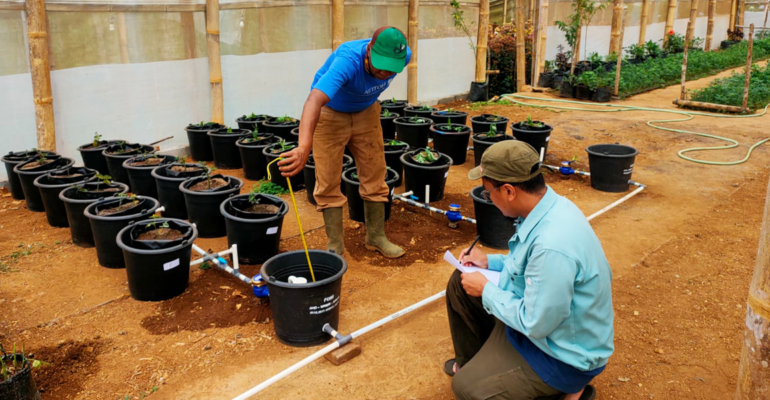Collaborating with Industry Partners, IPB University’s SIL Faculty Tests Automatic Zero-Energy Fertigator for Flowers and Vegetables

The Civil and Environmental Engineering (SIL) Faculty at the Faculty of Agricultural Technology (Fateta), IPB University, continues to develop partnerships with industry partners, one of which is through the innovation of the Automatic Zero-Energy Fertigator (FONi). This innovation is implemented in the greenhouse of PT Malino Highland located in the Agrotourism Area in Malino, South Sulawesi.
The IPB University SIL faculty team, led by Dr Chusnul Arif, conducted the planting of flowers and vegetables using the FONi innovation, accompanied by Dr Suhardi from Hasanuddin University. This activity is part of the 2023 Kedaireka Matching Fund program in collaboration with PT Malino Highland.
“On this occasion, together with our industry partner, PT Malino Highland, we planted three types of flowers and three types of vegetables with the FONi that were assembled by the partner themselves, whom we had trained before,” said Dr Chusnul Arif.
The FONi technology was initiated by Prof Budi Indra Setiawan, a senior lecturer in the SIL Department at IPB University, and its patent has already been registered. According to Prof Budi, FONi is easy to assemble, with almost 100 percent of its components produced domestically.
“FONi has many advantages, including efficient water usage, reducing electricity consumption, and increasing labor productivity by minimizing operator involvement,” said Prof Budi.
This sentiment was affirmed by Zainal, one of the employees at PT Malino Highland. “FONi is easy to assemble and use. We successfully assembled 12 FONi sets after being trained by the IPB University team,” said Zainal.
The hope is that FONi can address water scarcity, which often occurs during the dry season. “FONi is very beneficial in the dry season because it can save water and requires minimal water,” he added.
This activity is also an implementation of the Independent Campus Learning Freedom (MBKM) program initiated by the Ministry of Education, Culture, Research, and Technology (Kemendikbudristek) involving three universities: IPB University, Hasanuddin University, and Sriwijaya University.
“Hopefully, this activity will be successful and increase the benefits for industry partners, as well as for universities in achieving key performance indicators (KPIs) and other target achievements,” said Dr Chusnul. (CHA/Rz) (IAAS/Hap)



